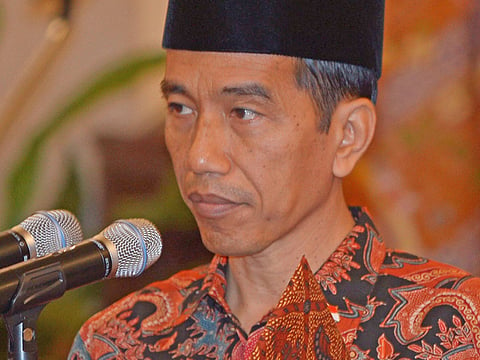Indonesia president Joko Widodo rapped over hardline defence minister Ryamizard Ryacudu
Activists say it marks a step backwards for human rights

JAKARTA: Indonesia’s reformist new president Joko Widodo has come under fire for appointing a hardline ex-general as defence minister, with activists saying on Wednesday it marks a step backwards for human rights.
Widodo, the country’s first leader from outside the political and military elites, surprised observers by naming former army chief of staff Ryamizard Ryacudu to his cabinet at the weekend.
Activists have alleged that abuses took place during his leadership of military operations to quash separatist groups in Aceh, on western Sumatra island, and in the eastern region of Papua.
In 2003, he was criticised for praising a group of soldiers who had been jailed for killing a Papuan pro-independence leader as “heroes”.
“There is a pessimism that he will respect human rights,” said Al Araf of prominent rights group Imparsial.
John M. Miller from the East Timor and Indonesia Action Network added: “The appointment of a hardliner like Ryamizard Ryacudu tells us that President Widodo is not serious about promoting human rights or reaching out to Papua.”
However the United States, a key ally of Indonesia, sought to play down the concerns.
“We are certainly aware of the allegations of human rights violations committed by the Indonesian army while the general served as army chief of staff,” said State Department spokeswoman Jen Psaki.
“We are not, however, aware of any allegation that ties the defence minister explicitly to a specific human rights violation.”
She also noted that the military, which used to play a central role under the regime of dictator Suharto, had transformed “in significant ways” since the country became a democracy in 1998.
The move was also criticised as it broke with the tradition established since the end of Suharto’s three-decade rule of appointing a civilian as defence minister, a practice intended to demonstrate the supremacy of the civilian establishment over the military.
During authoritarian rule, Indonesia’s military had enormous political influence, enjoying unelected parliamentary representation as well as the fruits of a large business empire.
However since Suharto’s downfall, the military has been stripped of its seats in the parliament and plays a far smaller role in public life.
Sign up for the Daily Briefing
Get the latest news and updates straight to your inbox



